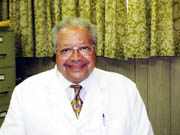On a summer evening in 1968, Dr. Kenneth W. Mahan received a phone call at 4 a.m. from the Jersey City Medical Center. What followed, he said, was the most astounding experience he has had in the 50 years of practicing medicine.
The internist on the other line told Mahan that he needed immediate help with a patient who had a “splinter.” When Mahan asked the internist why he could not remove it himself, the reply was, “It’s a big splinter.”
Mahan shortly arrived at the hospital to find a 24-year-old male with a two foot by four foot wooden plank impaled into his body. The injury occurred in a car accident earlier in the evening when the wooden board rammed through the bottom of the vehicle into a man’s leg and stomach.
During five and one-half hours of intense surgery, Mahan sawed the wood in two pieces, removed it from the body, and cleaned the man’s organs before stitching him up. Fortunately, Mahan said, the wood missed piercing any major organs and he was soon on the road to recovery.
“I call him my miracle patient,” Mahan said.
Since 1952, Mahan has been a staff physician at the Jersey City Medical Center, conducting general surgery operations during most of those years. As a general surgeon, Mahan has routinely operated on hernias, gallbladders, colons, and abdominal cavities during his career. Aside from being an accomplished physician who has served on many medical boards, Mahan has also made strides for African-Americans in the medical field. When he arrived at the medical center in the early fifties, Mahan recalls being the second African-American surgeon in the hospital.
Born in Wheeling, W.Va., Mahan recalls a childhood fascination with the sciences. His father purchased a chemistry set for him when he turned 13, and Mahan has never stopped toying with test tubes since.
“I always wanted to be a scientist,” Mahan said.
Rather than look up to star athletes as an adolescent, Mahan idolized the highly esteemed George Washington Carver, an African-American scientist. In fact, Mahan tried to follow Carver’s lead during his first years as an undergraduate at Hampton College by concentrating on agrarian science.
Into the Army
Forever preoccupied with his studies, Mahan enrolled in Hampton College for two years before being drafted into the Army in 1944. He served a two-year tour in the Philippines at which time he made the decision to pursue medicine. Upon his return, Mahan used the money granted to him under the G.I. Bill to enroll at Howard University, an African-American university in Washington D.C. Soon after, he was accepted into Howard’s medical school where he received his doctorate. Before finishing, however, the money from the G.I. Bill ran dry and Mahan had to work nights in the Census Bureau as a clerk to pay for his education.
“I really had it tough that last 18 months,” Mahan said. He recently received the Golden Merit Award from Howard for his 50 years of medical practice.
Even after receiving his license to practice medicine, Mahan continued his studies by routinely attending medical conventions where colleagues discussed the latest techniques in surgery. He spent a year studying advanced surgery at Harvard University in 1967.
When he had to decide where to do his residency, Mahan became interested in Jersey City Medical Center, one of the largest hospitals in the country at that time. “I didn’t want to stay in Washington D.C., and Jersey was the right place, I felt,” Mahan said.
In 1976, Mahan served a one-year term as the president of the Hudson County Medical Society, again the second African-American to do so. At the time, a flu epidemic was sweeping the country and low-income families were less likely to get the immunization shot. With the help of a few other doctors, Mahan initiated the mobile van health care facility that brought the shot into the poor communities and offered free services.
Still active
Nowadays, Mahan claims he is in “semi-retirement,” which somehow involves working five days a week. “I want to stay with it as long as I can,” he said.
Although he does not go into the surgery room any more, Mahan splits his days between working at his private practice on Bergen Avenue where he evaluates disabled people for Social Security, and a clinical hospital in Oakhurst, New Jersey where he bought a home several years ago.
In terms of leaving a legacy, Mahan takes much pride in the fact that his three daughters have entered the medical profession.
With three cousins in the medical field and two teenage granddaughters talking about their interest in becoming doctors, Mahan said, at “family reunions, we talk medicine.”
